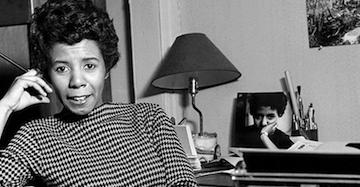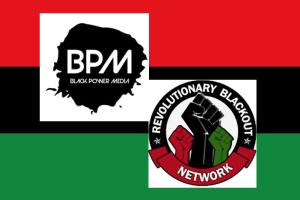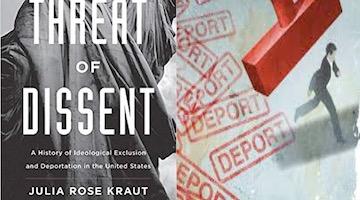Eslanda Goode Robeson stood tall against red-baiting. So should we.
Last week we published Paul Robeson’s 1953 unpublished statement to the House Un-American Activities Committee. This week we are publishing Eslanda Goode Robeson’s account of her appearance before the same committee. Both Mr. and Mrs. Robeson were targeted by the Army-McCarthy Hearings for their sympathies toward the Soviet Union. Both Mr and Mrs Robeson’s skewered their red-baiting inquisitors, turning the hearings upside down, driving home the hearing’s farcical and fraudulent character. And both Mr and Mrs Robeson used their appearances before the committee to draw attention to the status of African Americans as second class citizens within the United States.
Why are we republishing the Robesons’ statements against McCarthyism, statements made more than half a century ago during the fearful days of the Cold War? Well, if you haven’t noticed, red-baiting is back, baby! Take, for instance, Kamala Harris’s anti-Communist campaign ads. Or the federal government charges against the Uhuru 3, alleging that they conspired to work with Russia. Or Secretary of State Anthony Blinken’s recent assertion that the pan-African media platform African Stream gives voice to “Kremlin propagandists.” We are in the midst of an era of propaganda and paranoia that rivals that of Cold War McCarthyism. Then, as now, the ostensible target was Soviet or Russian or Communist influence, but the mark is domestic dissent and criticism of US policy, especially from those unruly Blacks who oppose racism and corporate control at home — and whitesupremacist imperialist violence abroad.
In 1953, Mrs Robeson wrote: “I believe the real purpose of the McCarthy committee and all the other congressional committees prying into people's politics and preferences is to scare the people into silence so that there will be no real fight for equal job rights, full voting rights, and an end to all segregation and discrimination.” In 2024, that strategy of fear — of scaring the people into silence — is being mobilized again. Mrs Robeson stood tall against that fear. So should we.
Sen. McCarthy Called Me
Eslanda Goode Robeson
I was at home in Enfield, minding my own business, working very hard on an article about MAU MAU, when the McCarthy Senate Investigation ordered me to appear before it in Washington, D.C.
The committee said it had called me because two of my books, Paul Robeson, Negro, and African Journey, are in the American Overseas library, and therefore they have to find out whether or not I am, or ever was, a Communist.
(I should have thought books would be chosen for what was inside them, not for what somebody may have said about the author.)
The committee asked me what my name was, and if I was married to Paul Robeson. I said I was, and was very proud of it.
They asked me if I had written African Journey all by myself, or did somebody help me write it. I said, do you think because I am a Negro and a woman, I can’t write a book all by myself. Of course if I’d had any help on the book, I would have formally acknowledged such help in a foreword, as all honest writers do. I said I was insulted by the question.
They asked me if I had got any royalties from the book. I said yes, a lot.
They wanted to know if I had contributed any of said royalties to the Communist Party. I said I’d taken all the royalties and gone to Africa.
They asked me if I was a member of the Communist party when I wrote the book. Was I a member now? Under the protection given me by the 5th and 15th amendments of the constitution of the United States, I refused to answer these questions.
The 15th Amendment stopped them cold. It had never been used before in these hearings. They said I couldn’t use it. I said the committee was very white, and I am a Negro; therefore, I need the 15th Amendment.
The chairman carefully explained to me that all citizens who testify before this committee were equal, white and black, Catholic and Jew, etc. etc. etc.— you know that old American party line. But I insisted that as a Negro in these United States I was discriminated against and treated like a second class citizens; therefore, I needed the 15th as well as the 5th Amendment.
The chairman said the committee was all white because there are no Negro senators. I said that is part of the discrimination. The chairman said No, it was because the voters did not elect Negro Senators. I said the bulk of the Negro people are in the South, where force and violence precent the Negro people from voting freely, or at all.
The committee asked me if it was not true that my husband and I had stated that we wanted our son to be educated in the Soviet Union. I said, we had both said that we would try to give him the very best education we could get from everywhere, and we had tried to do so. He has spent most of his 27 years here in the United States, 11 years in England and on the Continent, and 1 1/2 years in the Soviet Union. 1 1/2 out of 27.
They asked me if we had ever taken out citizenship papers in the Soviet Union. Never.
If my husband had ever said he’d rather live in the Soviet Union than anywhere else in the world. I said, “Why don’t you ask him?”
They asked me if I thought the Soviet government was better than the United States government. I said I though the constitution and the Bill of Rights of the USA are simply marvelous, and I had been working most of my life to have them implemented for the Negro people.
They asked me if I do not think the Communist party teaches and advocates the overthrow of the United States government by force and violence. I said as a Negro I knew a lot about the force and violence used against my Negro people in this country, and that I never knew of any Communist who used it.
They asked me if I did not think there were some white people in this country who wanted to help me win my first class citizenship. I said, Yes, and I appreciate it very much, but I thought there were too few of them, they were not effective enough, and it wasn’t going fast enough, because Negroes are still all second class citizens.
The chairman then asked me if I would not agree that Negores had made progress since slavery. I said No, I thought they had gone backwards, in comparison with progress made by other peoples in the world.
Way back in my grandfather’s time there were Negroes in the United States Senate; now there are none. During that period there were 22 Negro congressmen, and now there are two. Grandfather himself was Secretary of State and Treasury of the State of South Caroline during Reconstruction. Now there are no top level Negro state officials in the United States. And peoples in many other parts of world who were in colonial slavery then are now free and independent — and Mr. Nkrumah, a west African Negro, is prime minister of Ghana (Gold Coast).
I believe that the Senate Investigation committee had no right to ask me personal questions about my private opinions, thoughts, beliefs. I said so, clearly and emphatically. I resent interference with my work and life.
I am now going back home to finish the article on MAU MAU and to continue my work for first class citizenship, for the implementation of the Constitution of these United States, PLUS ALL ITS AMENDMENTS, for all our citizens and to work for peace and friendship with the people and peoples I like and choose, not [for] those [that] some very prejudiced people choose for me.
It may be said that I did not cooperate with the Senate committee. When the Senate cooperates with me and the Negro people to the extent of insuring our first class citizenship, then I will be able to give it first class cooperation in carrying out legitimate Senate business.
I believe the real purpose of the McCarthy committee and all the other congressional committees prying into people's politics and preferences is to scare the people into silence so that there will be no real fight for equal job rights, full voting rights, and an end to all segregation and discrimination.
Congressional committees or no congressional committees, I’m going to keep on fighting, and I believe the whole American people will, too.
Eslanda Goode Robeson, “Senator McCarthy Called me,” The St. Louis American (16 July 1953















